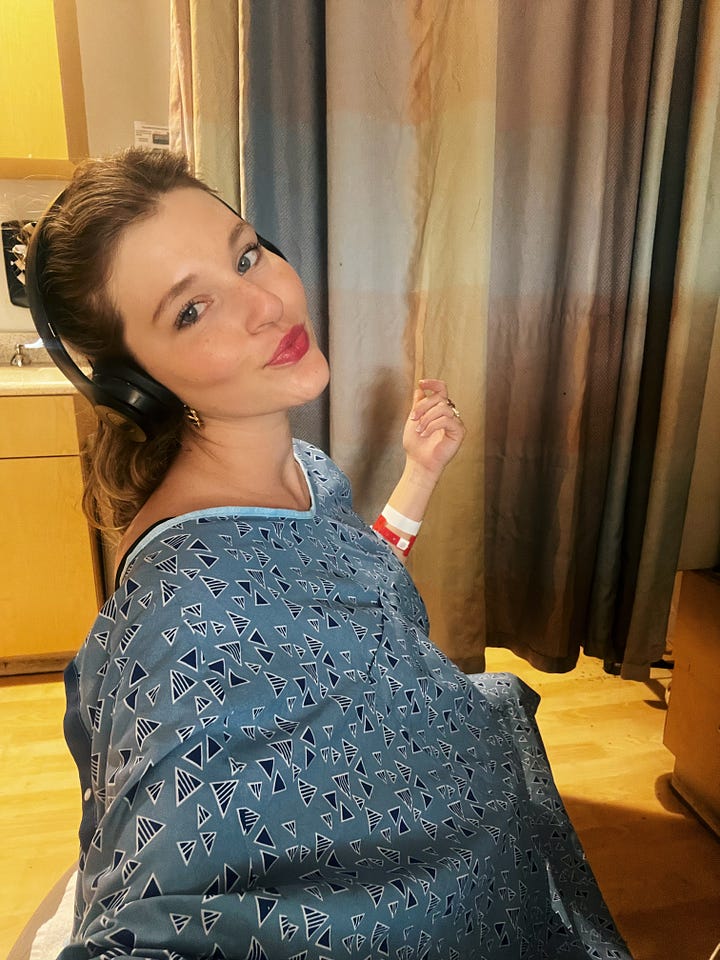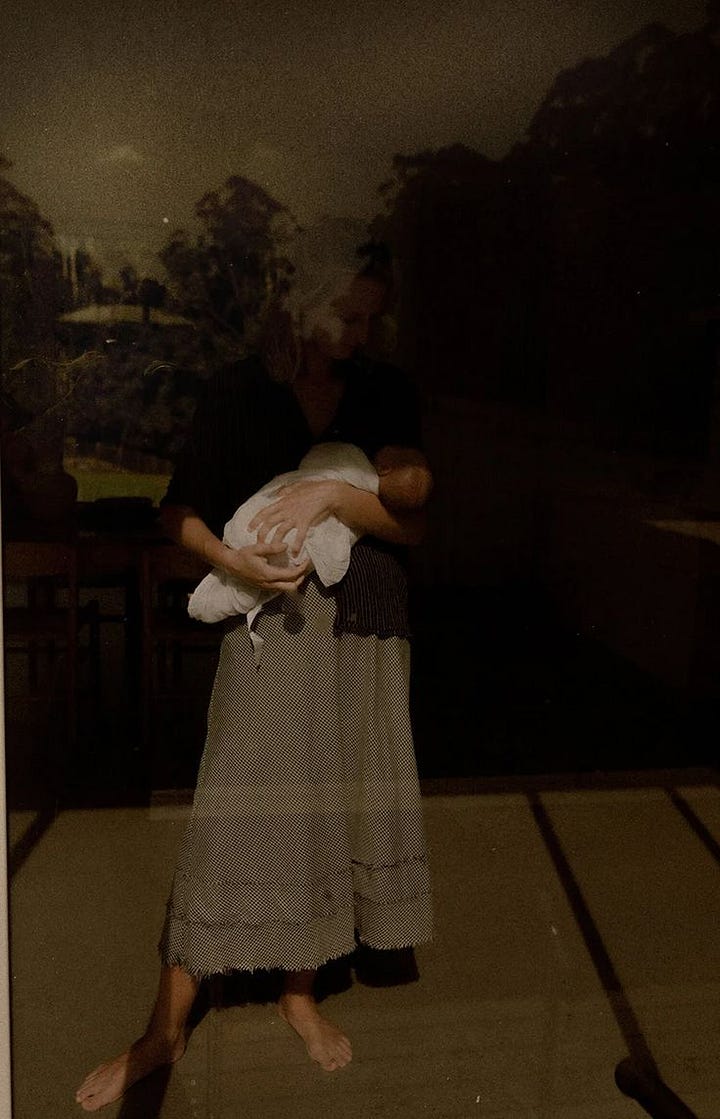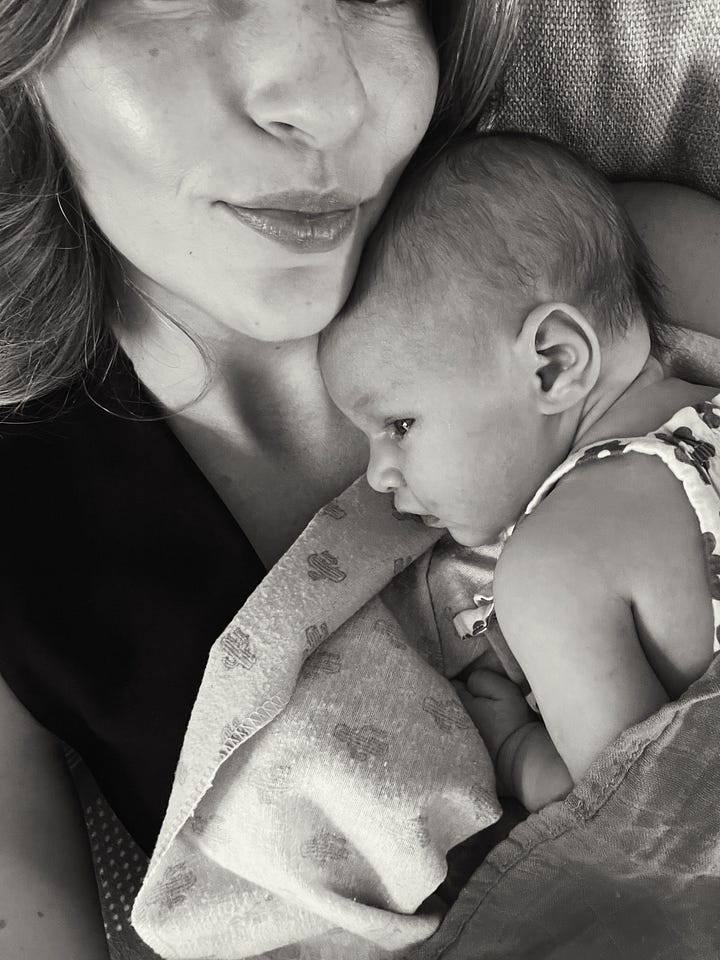Birthing my daughter and learning to be a new mom has been the most beautiful, liberating, and challenging experience I've ever faced.
I've been Reyna's mom for 4 weeks now, and I'm eternally grateful that she chose me to be hers forever. She has turned out to be better and more surreal than I ever imagined during the 9 months she was in my belly. Despite this period being an emotional roller coaster, it's a privilege to be the newfound matriarch of our growing family.
My birth plan ultimately deviated from its course, and there were many lessons along the way that I had to confront despite my best efforts to reroute the inevitable. I ended up delivering 11 days past my due date with multiple interventions from the hospital staff, which took me far from my original birth plan. Although the American healthcare system, unfortunately, functions more like a business, often pushing unnecessary medications on patients — I do believe in the effectiveness of medicine for those who genuinely need it.
Alternatively, postpartum has (pleasantly) surprised me in numerous ways I wasn't expecting, no matter how difficult the feedings can feel every 2-3 hours or how intense her crying spells become during the "witching hour."
Everyone's experiences are vastly different; such adventures only come to life when lived.
Nevertheless, I'm profoundly grateful for my healthy pregnancy and childbirth experience despite the roadblocks or challenges we encountered as a family. Reflecting on my initial hopes and anxieties about these experiences, it feels surreal to have come through to the other side.
I've made it; I'm here. I'm ready for whatever comes next. This is just the beginning.
You guys — there's so much to talk about, and I'm still learning everything there is to know. I don't claim to have everything figured out or believe my thoughts and opinions won't evolve with more experience. However, I believe in the importance of maintaining a positive and confident mindset, even though 95% of the time, I feel like I'm completely lost. Writing down these lessons helps me feel like I have some control over the chaos.
Below are the 6 biggest lessons I've been eager to share.
*Disclaimer: Please take what I say as a personal antidote only. Everyone's experience of this uniquely tailored journey can differ from person to person and pregnancy to pregnancy. There's never a one-size-fits-all.
1.) "Birth Plans" Rarely Go As We Want
Let's agree to rename this popular term as "birth wishes," shall we?
I was fully committed to experiencing childbirth naturally — without medication, interventions, or induction. My husband and I attended five hypnobirthing classes in person, celebrating the strength of a woman's body through breathwork, focus, and surrender. I embraced the process:
Devouring books
Immersing myself in positive affirmation meditations
Diligently taking notes in each class like a model student
While I acknowledge that exceptional circumstances can arise and we can't always control spontaneous, natural events like childbirth, I strongly believe in the power of a healthy mental attitude. Despite its seemingly silly name, hypnobirthing aims to teach this core lesson.
I opted for the classes to gain a biological understanding of what was occurring within my body before going to the hospital. I became armed with a wealth of knowledge, including particular breathing techniques and meditation practices to ease my body during contractions and strategies to assert my wishes in the face of pressure from nurses or doctors.
But — my desire for a completely natural childbirth did not come true. sighs
Where were the discussions on mandatory inductions?
How should one proceed if natural labor doesn't occur?
Wasnn’t my body supposed to do this naturally? Does this mean my body let me down?
My body never initiated labor on its own, and even after a 12-hour induction attempt with Cervidil at the hospital on days 41 + 2, my contractions subsided enough for me to be sent home without any further progress. By day 41 + 4, an exceptional healthcare team at Mercy Gilbert intervened to manage the remainder of my care.
In simple terms, my daughter's arrival was made possible only through being receptive to medical intervention.
2.) I Know It's Hard, But Don't Get Discouraged
While the serene, positive birth stories of women giving birth in remote cabins, surrounded by family and experienced doulas, are undoubtedly incredible — it's because their bodies naturally progressed to that point.
However, I couldn't experience natural, spontaneous labor before the commonly accepted "due date."
Reflecting on this, I recognize how trivial my concerns now seem. Why was I so wrapped up in my expectations and desires rather than focusing on the safest way to bring my daughter into the world?
Now that she is here and has been in my arms for a few weeks, those details feel almost insignificant, a mere memory.


3.) "Natural Induction" Methods Are Inconclusive
Before anyone asks, the answer was a resounding yes to whether I tried any natural induction methods. Obviously!
Starting at 36 weeks, I began consuming raspberry leaf tea, engaging in pelvic floor exercises, walking 2-3 miles daily, and performing perineal massages. By week 38, I was doing all that plus every other method known to Google: dates, pineapple, sex, nipple stimulation, breast pumping, curb walking, the miles circuit, plenty of yoga, gardening, taking baths, using primrose oil, doing yoga ball exercises, meditations, breathwork, and more.
I drew the line at castor oil, though (sorry, but I preferred to avoid the risk of diarrhea).
Look, if spicy pineapple juice and an hour of breast pumping triggered your labor — good for you! I'm jealous. Or, perhaps it was all just a coincidence.
Babies arrive when ready, yet they benefit from a robust support system.
Despite our best efforts to induce labor through Google’s endless suggestions, including an all-organic diet and exercise routine, I firmly believe it boils down to genetics or mere coincidence (though I’m no doctor, so take this with a grain of salt!). My OB-GYN echoed a similar sentiment during the final weeks of my pregnancy; not all experiences fit neatly into a blog post or a perfectly tied bow.
Embracing the unknown is part of the journey, no matter how daunting or uncertain it may seem.


4.) Postpartum Is Really Hard But Manageable
Trust your instincts; you usually know more than you think you do!
Postpartum is unlike any other human experience I've had. It combines highs and lows, balancing overwhelming joy and challenging discipline.
Time and again, I've heard about the so-called "horrors" of postpartum from Reddit and TikTok, which leave out no details: hair loss, depression, a loss of personal identity, the 6-10 weeks of intense vaginal bleeding or c-section recovery, sleep deprivation, and the perpetual worry about whether you're doing anything right. The list is lengthy, tiring, and overwhelming, but it's also incredibly rewarding.
Two truths can exist at the same time.
I've always been open about my lengthy struggle with mental health issues, including my diagnosis of Bipolar 1 Disorder in 2018. These challenges had become much more manageable in recent years, allowing me to stop taking medication just before becoming pregnant.
Remarkably, I haven't felt the need for an extra dose since becoming pregnant or giving birth, almost as if my hormones have found a natural balance unexpectedly. I was convinced I'd be a prime candidate for postpartum depression, but fortunately, that hasn't been the case yet.
Despite the challenges of constant cluster feeding, unpredictable crying spells, and sore nipples, I wake up every day aiming to make it the best day possible. This doesn't imply that I haven't faced severe meltdowns (believe me, I have), but they ebb and flow with the comforting knowledge that the discomfort is temporary.
It's like a certain survival instinct kicks in — you're virtually on the edge, figuring out how to deploy your parachute as you fall. I'm amazed by my ability to navigate this uncharted territory despite my lack of experience with infants.
There's no shortage of daunting and profound stories of postpartum that need to be told, as these personal experiences are valid and resonate with many mothers and parents. But it's also important to highlight the beauty and tranquility that can be found in this unique emotional journey. Despite the mental breakdowns, I've unearthed deeper facets of my inner self than I have in the 28 years before becoming a mother.
I've gone through my share of emotional upheaval, pondering my role as a woman in a constantly evolving industry and how to juggle my creative endeavors with being a first-time mom. Yet, for every moment I spend in tears, pondering an endless list of what-ifs, there are more moments filled with comfort in the knowledge that I'll navigate the challenges one way or another.


5.) Feedings Are the Hardest Part (For Me)
We practice "combo feeding," which means feeding our daughter breastmilk from the boob and through a bottle, supplementing with formula only as necessary. She consumes 3-4oz every 3 hours, an impressive amount considering her size, indicating she gets starving if we're not diligent with her intake. My husband is incredibly supportive, taking over the midnight feeding so I can get a longer stretch of sleep before I take on the day alone while he's at work (thank heavens for maternity leave; I'm soaking up every moment I can get with her one-on-one!).
Despite our attempts to maintain a consistent schedule, babies don't quite grasp the concept of time. Their immediate wants and needs drive them. Around 70% of our days go smoothly, with her feeding well and without much fuss, but the remaining 30% can be VERY hard.
As I navigate the early stages of my breastfeeding journey, I'm still adjusting to a regular pumping and nursing routine. Consequently, my milk supply is gradually increasing but has yet to reach the volume she needs for her 8-12 daily feedings. Introducing formula is hit or miss; sometimes she takes to it well, while other times it seems to upset her stomach. Pumping feels like a monumental task; it's beneficial for storing significant amounts of milk for outings, but it requires commitment — pumping 6-8 times a day for 20 minutes each session to signal my body to continue producing enough milk adequately. Sitting there with the pump flanges attached, I can't help but liken myself to a dairy cow at Shamrock Farms.
She's hungry. Feed her. Feed her more. Burp her. Clean her spit up. Change her diaper. Change her clothes. Hold her, love on her, then put her down. Pump for 20 minutes. Clean the bottles and disinfect the pumping parts. Look at the clock. 1.5 hours went by, and if lucky, I only had about an hour of free time before I had to do this all over again. Repeat. Repeat. Repeat. Repeat. Repeat. Repeat.
To be honest, it's overwhelming. No one explained how physically demanding it would be or how emotional it gets when your milk supply doesn't meet your expectations quickly. For a woman determined to breastfeed, it requires constant vigilance on top of all the other daily responsibilities. Hours can slip by without me realizing I haven't taken a moment for myself.
People say this phase will pass, and things will get easier. Is it so wrong to wish for that relief now? It's challenging to enjoy the newborn stage when it feels like I'm constantly sacrificing my body without any immediate signs of appreciation — no smiles, no thank yous, no confirmation that I'm doing things right. Just a fussy baby who occasionally spits up on me, with my husband not around to immediately reassure me I'm doing everything correctly because he's back at work. Ha — see how easy it is to spiral?
But my daughter and I are both navigating this new world together. She's learning to latch, suck, and swallow just as much as I'm learning to pump, feed, and burp her, among everything else. We're on this journey side by side. When I see how secure and content she feels skin-to-skin on my chest, or even with her dad on the couch during a bottle feed as we watch a show, I'm reassured that everything will turn out fine, crying spells and all.
Motherhood is wild.


6.) There Is No "Going Back"
And that's pretty damn liberating.
We often hear about the concept of "bouncing back." Typically, this refers to how quickly a woman can return to her pre-pregnancy pant size, but "bouncing back" can also describe a mother's yearning to reconnect with her "old" self — the fear of losing her individuality upon entering parenthood.
The reality is — and I've realized this pretty quickly — our former selves may never return. Or if they do, they'll be transformed, feeling completely different. And what an incredible realization that is. How freeing it is to acknowledge that you're evolving, gaining emotional intelligence and discipline more than ever?
As much as I cherished who I was before pregnancy, I am now all that and much more. And I'll only continue to improve.
There's nothing I'd exchange for this experience, and I sincerely mean that. These initial weeks (and the months ahead) are profoundly challenging. Yet, I can already sense a chemical shift within me: enhanced discipline, increased emotional stability, improved reactions, heightened empathy, and more extraordinary patience. My maturity levels are soaring, and I have a more robust set of tools at my disposal. I feel like a warrior.
She will be my foremost thought for at least the first decade of her life. I can only run a simple errand if I consider her needs first. Planning spontaneous trips or vacations now requires additional forethought; securing a babysitter becomes a looming question of who might look after her for even an hour. How will work trips fit into this new dynamic? What about date nights? Do I maintain my independence?
In my later years, I felt fulfilled with a successful career, a loving husband, the home we are building together, and memories from traveling to nearly 30 countries. When I sensed the need for something "more," I realized it was time to embrace family life. While indulging in personal pleasures has its place, it eventually reaches a limit. And no, there's no turning back from this — nor do I wish for one.
Attempting to "go back" to one's previous self contradicts the essence of change. Regardless of our life experiences, our challenges encourage us to shed our former selves, paving the way for growth into something even more beautiful and rewarding.
I'm here, and I'm ready.





